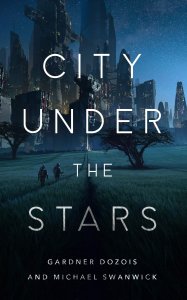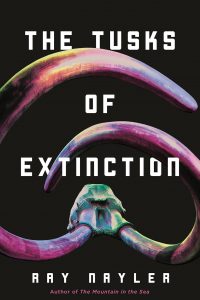Gary K. Wolfe Reviews City Under the Stars by Gardner Dozois & Michael Swanwick
 City Under the Stars, Gardner Dozois & Michael Swanwick (Tor 978-1250756589, $14.99, 272pp, tp) August 2020.
City Under the Stars, Gardner Dozois & Michael Swanwick (Tor 978-1250756589, $14.99, 272pp, tp) August 2020.
As any number of people observed after his untimely death in 2018, Gardner Dozois’s phenomenal career as an editor and his ebullient public presence at conventions vastly overshadowed his own achievements as a writer – though he won back-to-back short fiction Nebulas back in the 1980s – and that same ebullience may have led some to be surprised that his fiction could take some pretty dark turns. A quarter-century ago, he and Michael Swanwick published a novella titled “The City of God”, and some 20 years before that (according to Swanwick), Dozois had begun what he called “the Digger novel,” but had gotten stuck on a plot point that neither he nor Swanwick nor Jack Dann had been able to resolve satisfactorily. All this information comes from a warm and fascinating afterword by Swanwick to The City Under the Stars, which he has fashioned from that abortive novel and the novella, giving it a title that sounds a good deal more like Clarke and less like Augustine, which seems more appropriate given the way things play out. And, for most of its rather modest length, it’s pretty grim.
Merely to survive at a subsistence level, Hansen needs to work backbreaking ten-hour shifts shoveling coal in a distant future which combines an almost feudal social structure with high-tech remnants of a Utopian society, that has apparently retreated behind a massive, impenetrable Wall stretching across much of the Eastern seaboard, in what is called the City of God. Facing the loss of his job after a stronger, younger worker arrives, Hansen murders the foreman who has long been his nemesis, and manages to escape on a giant Utopian-era freight transport, still functioning flawlessly after centuries, even though no one would know how to repair it anyway. He temporarily joins a band of outlaws and later meets a mysterious figure called the Preacher, who seems to know something about how to get into the City of God. It would be churlish to reveal exactly what Hansen finds once he gets there, but it’s fair to say that the City of God partakes of another SF tradition, which I’ve come to think of the Zone of Random Hazards – an area which seems to promise great secrets, but where the slightest misstep could result in surreal, grotesque, or even fatal consequences (the labyrinth in Budrys’s Rogue Moon, the Visitation Zones of the Strugatsky’s Roadside Picnic, M. John Harrison’s Kefahuchi Tract, etc.). And there’s at least one spectacularly gruesome death to underline this principle of arbitrariness.
As Swanwick accurately claims in his afterward, he manages to find a satisfactory resolution to the puzzle presented by the City of God, and one that offers some relief to poor old Hansen – but not before he suffers months of imprisonment, torture, and brutalization, largely at the hands of a nasty fellow who makes his old foreman nemesis look like a kindly uncle. That also has the advantage of giving the tale an eminently hissable villain, which is pretty much de rigueur for a fable of injustice and resolve. Whether or not, given the frequent pessimism of Dozois’s fiction, Swanwick’s decision reflects the sort of ending Dozois himself might have chosen is largely irrelevant: the question is what the novel itself needs. Swanwick has already honored his friend’s legacy by echoing without aping his style – unadorned direct exposition, comparatively sparse dialogue – and the final honor is giving us a smart and hopeful tale that’s a corker, even if you’ve never read a word of Dozois’s fiction.
Gary K. Wolfe is Emeritus Professor of Humanities at Roosevelt University and a reviewer for Locus magazine since 1991. His reviews have been collected in Soundings (BSFA Award 2006; Hugo nominee), Bearings (Hugo nominee 2011), and Sightings (2011), and his Evaporating Genres: Essays on Fantastic Literature (Wesleyan) received the Locus Award in 2012. Earlier books include The Known and the Unknown: The Iconography of Science Fiction (Eaton Award, 1981), Harlan Ellison: The Edge of Forever (with Ellen Weil, 2002), and David Lindsay (1982). For the Library of America, he edited American Science Fiction: Nine Classic Novels of the 1950s in 2012, with a similar set for the 1960s forthcoming. He has received the Pilgrim Award from the Science Fiction Research Association, the Distinguished Scholarship Award from the International Association for the Fantastic in the Arts, and a Special World Fantasy Award for criticism. His 24-lecture series How Great Science Fiction Works appeared from The Great Courses in 2016. He has received six Hugo nominations, two for his reviews collections and four for The Coode Street Podcast, which he has co-hosted with Jonathan Strahan for more than 300 episodes. He lives in Chicago.
This review and more like it in the September 2020 issue of Locus.
 While you are here, please take a moment to support Locus with a one-time or recurring donation. We rely on reader donations to keep the magazine and site going, and would like to keep the site paywall free, but WE NEED YOUR FINANCIAL SUPPORT to continue quality coverage of the science fiction and fantasy field.
While you are here, please take a moment to support Locus with a one-time or recurring donation. We rely on reader donations to keep the magazine and site going, and would like to keep the site paywall free, but WE NEED YOUR FINANCIAL SUPPORT to continue quality coverage of the science fiction and fantasy field.
©Locus Magazine. Copyrighted material may not be republished without permission of LSFF.




